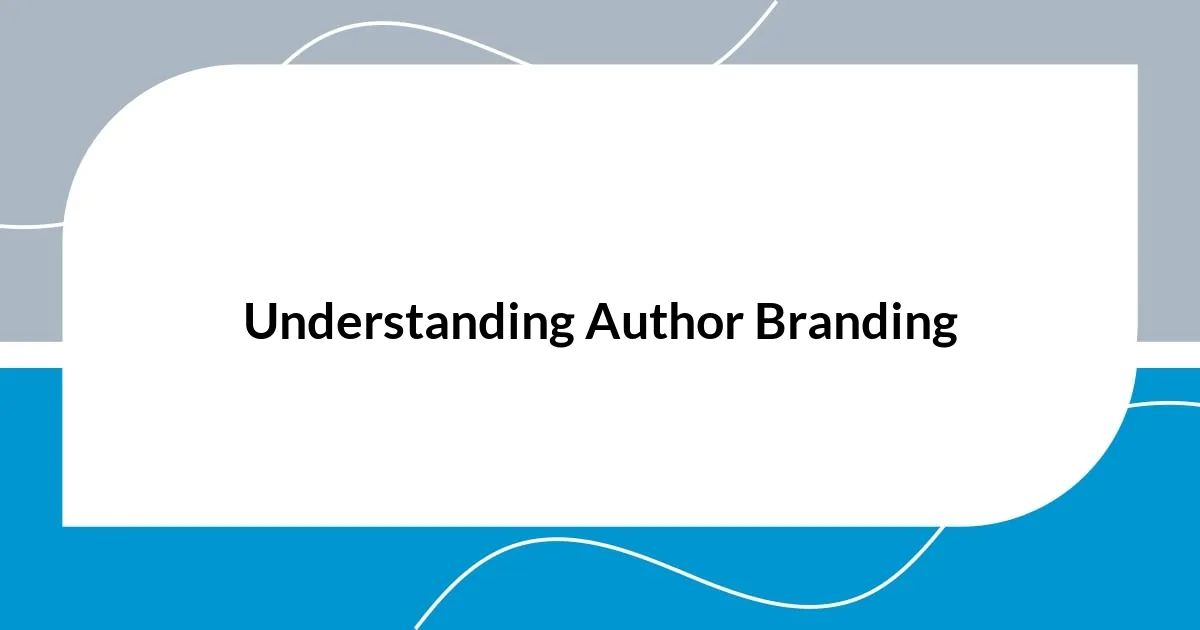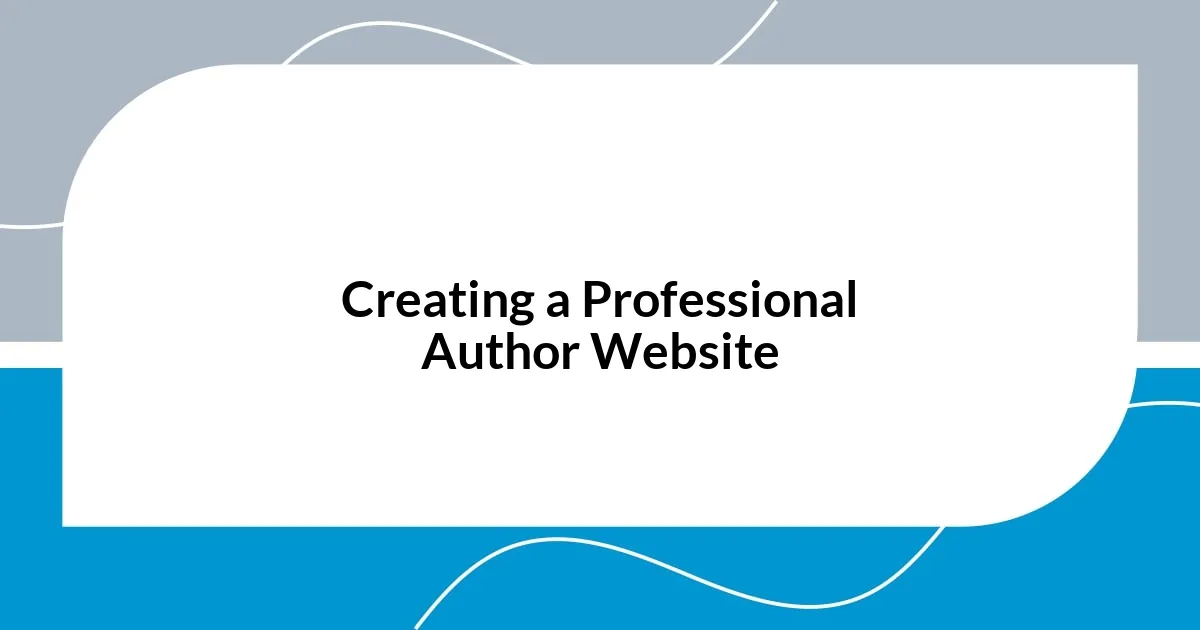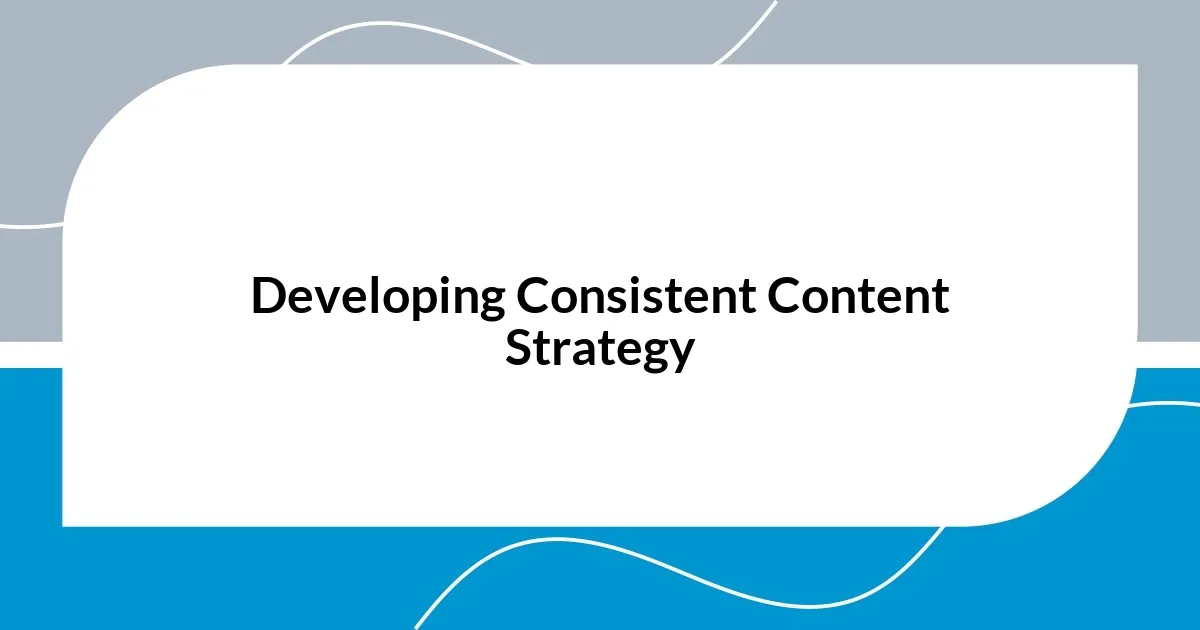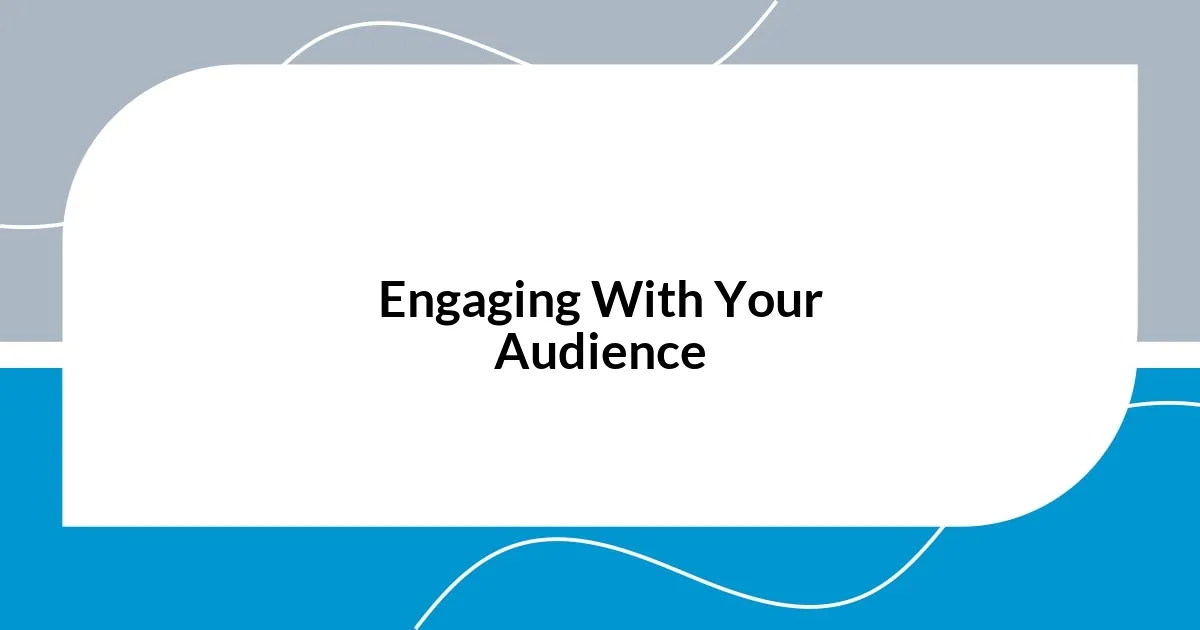Key takeaways:
- Author branding shapes reader perceptions; consistency and personal connection are vital for engagement.
- Identifying your unique voice involves introspection, reflecting on personal experiences, and experimenting with writing styles.
- A professional website is crucial for connecting with readers; include an engaging bio, a blog section, and ensure SEO optimization.
- Engaging with your audience through interactive formats (e.g., Q&A sessions and newsletters) enriches both their experience and your creative process.

Understanding Author Branding
Author branding is essentially how readers perceive you and your work. I remember early on, I thought my novels would speak for themselves, but soon realized that who I am as a writer—my values, my voice—shapes that perception. Isn’t it interesting how a reader might feel a connection to an author before even opening a book?
When I attended my first book fair, I witnessed firsthand the power of personal branding. I observed authors who seemed to draw in readers not just by their stories, but by their personalities. The conversations I had there made me reflect: What do I want my audience to feel when they think of my name? It’s a question worth pondering, isn’t it?
Understanding author branding goes beyond simply promoting your work. I learned that it’s about consistency—being relatable, authentic, and engaging across different platforms. For instance, my social media presence mirrors the themes in my writing while also showcasing my journey as an author, making it easier for potential readers to connect with me on a personal level. How vital is that personal connection in a world overflowing with content? To me, it’s everything.

Identifying Your Unique Voice
Identifying your unique voice is a journey that requires introspection and a willingness to explore what truly resonates with you. I remember sitting alone in my writing nook one rainy afternoon, jotting down what made me tick. It wasn’t just about the genre I chose; it was my passion for character-driven stories that reflected my own life experiences. Recognizing that connection helped me understand the authenticity I wanted to convey in my writing.
To help pinpoint your unique voice, consider these aspects:
- Personal Experiences: Reflect on events that shaped who you are, as these can add depth to your narrative style.
- Influences: Think about authors or genres that moved you. What elements do you admire?
- Emotional Resonance: Identify the feelings you want your readers to experience. Do you aim for joy, suspense, or contemplation?
- Language and Style: Experiment with different writing styles. What comes naturally to you? Consider how your choice of words reflects your personality.
- Feedback: Share snippets of your work with trusted friends or fellow writers. Their insights can highlight traits you might not notice about your voice.
Exploring these facets not only enhances your writing but also creates a memorable connection with your readers. Embracing this journey has been transformative for me, revealing layers to my writing that I hadn’t initially considered.

Creating a Professional Author Website
Creating a professional author website is a crucial step in establishing your brand and connecting with your audience. I vividly remember the thrill of launching my website; it felt like opening a door to a new world of possibilities. I carefully selected a clean design that reflected my style—simple yet inviting. This first impression matters more than we often realize. Does your website invite readers in, or overwhelm them?
It’s essential to include key elements that truly showcase who you are as an author. For example, I made sure to feature an engaging bio section that speaks to my journey and passion for storytelling. Additionally, I integrated a blog where I share insights and behind-the-scenes looks at my writing process. These personal touches turn a static site into a dynamic platform. Have you thought about how these features could enhance your connection with potential readers?
Moreover, optimizing your site for search engines is a vital strategy that can help attract visitors. I remember early on feeling frustrated when my site didn’t get the traffic I hoped for. Once I understood basic SEO principles—like using relevant keywords in my content and image alt texts—my site visibility improved significantly. It’s about ensuring readers can easily find your work among the sea of online content.
| Website Feature | Importance |
|---|---|
| Author Bio | Helps readers connect with you personally. |
| Blog Section | Informs and engages your audience, showcasing your personality. |
| SEO Optimization | Increases visibility, making it easier for readers to discover your work. |

Developing Consistent Content Strategy
Developing a consistent content strategy requires both planning and flexibility. When I first set out to create content, it felt overwhelming trying to maintain a regular posting schedule. I realized I needed to set realistic goals, so I opted for a monthly plan that allowed me to curate relevant topics without feeling rushed. How often do you find yourself overwhelmed by the need to produce content? Sometimes, less is more.
As I refined my approach, I discovered the importance of thematic consistency. For instance, I decided to align my blog posts with the themes in my writing, giving readers a sneak peek into my creative world. This not only created cohesion but also helped my audience understand what to expect from me. Have you considered how your content could mirror your overarching message? It’s a pathway towards deepening reader engagement.
Additionally, measuring my content’s performance has been a game-changer. I began analyzing which posts resonated with my audience, and the insights were enlightening. For example, after realizing that my posts about character development sparked lively discussions, I committed to creating more content around that. What feedback do you receive from your readers? Embracing their responses can significantly shape your ongoing strategy and help you become a better storyteller.

Engaging With Your Audience
Engaging with your audience is a dynamic process that goes beyond simply posting content. I remember the excitement I felt the first time a reader commented on my social media post. It was like a conversation starter! That connection transformed my experience from solitary writing to a shared journey where readers felt invested in my stories. Have you ever reached out to your audience in this way? It can be invaluable in building a loyal following.
I also found that hosting live Q&A sessions allowed me to deepen this engagement. The thrill of hearing real-time questions about my work was exhilarating. It’s intriguing to see what resonates with your audience when they feel empowered to ask. I remember one session where a reader shared how my book impacted their life. Those kinds of moments remind me just how meaningful our stories can be. Are you open to exploring new formats for connecting with your audience?
Moreover, utilizing newsletters became a powerful tool for me. It felt personal, like sending a letter to a friend. I often include not only updates about my work but also recommend books and share insights into my writing journey. Each newsletter feels like a little conversation, and I cherish the replies I receive. Do you nurture those connections? Engaging with your audience opens doors to enrich not only their experience but your own creative process too.

Measuring Your Brand Success
Measuring the success of my author brand can sometimes feel like deciphering a complex puzzle. Early on, I relied heavily on metrics like website traffic and social media followers, which initially gave me a sense of achievement. However, I soon realized that these numbers don’t always tell the whole story. What truly matters is how my audience engages with my work. Are they leaving thoughtful comments? Are they sharing my posts? These interactions convey genuine interest.
One memorable moment that helped me gauge my brand’s effectiveness was when I received a heartfelt email from a reader. She shared how my writing had inspired her to pursue her passion for storytelling, and her words illuminated the impact my brand had on her life. That anecdote was a wake-up call for me; it wasn’t just about the numbers anymore! It was about forming connections that resonate on a deeper level. Have you ever measured success by the lives you touch rather than just the stats?
Additionally, I started conducting surveys to directly ask my readers what they enjoyed most about my work. The feedback was eye-opening! For instance, many expressed a love for the personal stories I included in my writing, prompting me to share more of my journey. I genuinely believe these insights are gold. They not only provide direction for future content but also reaffirm that my brand evolves alongside my audience’s preferences. So, how do you currently assess the success of your own brand?